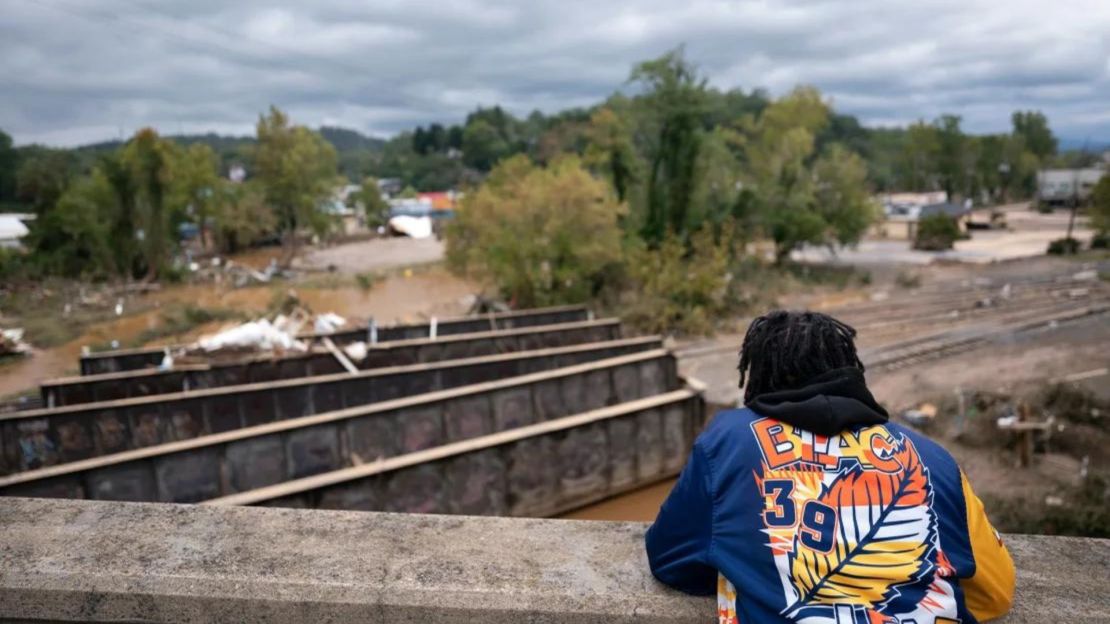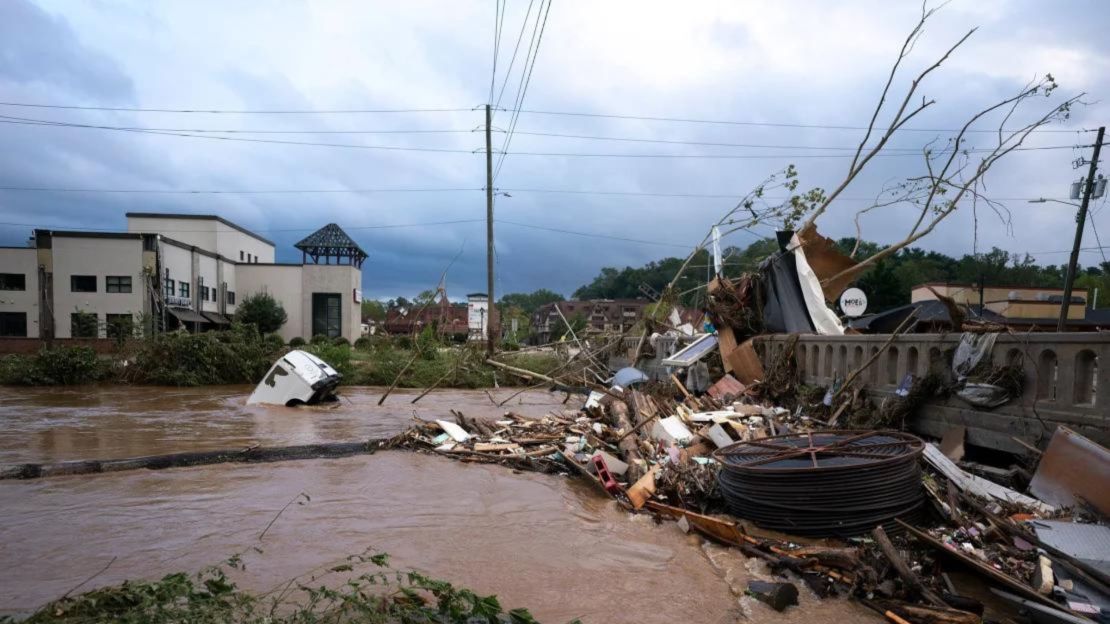() – The southeastern United States faces widespread devastation after Helene made landfall on Thursday as the strongest hurricane on record to hit the Big Bend region of Florida and devastated several states, killing at least 89 people, leaving millions without power and trapping families in flood waters. In hard-hit North Carolina, days of relentless flooding turned roads into waterways, left many without basic needs and strained state resources. Here’s what’s recent:
-About 90 dead in 5 states: Deaths are reported in South Carolina, Georgia, Florida, North Carolina and Virginia. At least 36 people have died in North Carolina, according to county and state officials. At least 24 died in South Carolina, including two firefighters in Saluda County, authorities said. In Georgia, at least 17 people have died, two of them from a tornado in Alamo, according to a spokesman for Gov. Brian Kemp. In Florida, at least 11 people died, Gov. Ron DeSantis said Saturday, including several people who drowned in Pinellas County. One person died in Craig County, Virginia, from a falling tree and building collapse related to the storm, Gov. Glenn Youngkin said Friday.
-Numerous reports of missing people amid communications outages: Officials in Buncombe County, North Carolina, have received more than 1,000 missing person reports through an online form, county administrator Avril Pinder said Sunday, warning that that figure likely includes duplicate submissions and that communication breakdowns mean that people are struggling to communicate with each other. However, authorities cannot conduct welfare checks. The governor echoed that, telling reporters at a news conference: “We know that a lot of these people are just out of touch and they’re fine.” The state’s telecommunications partners have activated disaster roaming on all networks, meaning “any phone from any carrier can access any network to make calls,” said state emergency management director William Ray. .
-Hundreds of road closures in North Carolina hamper water supply: About 300 highways are closed in North Carolina and another 150 are closed in South Carolina, acting federal highway administrator Kristin White of the U.S. Department of Transportation said Sunday. North Carolina officials acknowledged Sunday that those closures hampered the delivery of water supplies to communities in need, such as the city of Weaverville in Buncombe County, which is without power or water, Mayor Patrick Fitzsimmons said. Seven water plants across the state, in Avery, Burke, Haywood, Jackson, Rutherford, Watauga and Yancey counties, were closed as of Saturday, affecting nearly 70,000 homes, Gov. Cooper’s office said. 17 water plants reported having no power.
-Millions of people without electricity in the southeast: The remnants of Helene continued to knock out power to several eastern US states on Saturday, with approximately 2.5 million customers in the dark in South Carolina, North Carolina, Georgia, Florida and Virginia, according to PowerOutage.us. This Sunday, a spokesperson for the US Department of Energy said there was no estimated time frame for power restoration, noting that widespread flooding and debris prevent access to damaged infrastructure.
-“It seems like a bomb exploded” in Georgia: Helene “forgave no one,” Gov. Brian Kemp said Saturday. Among the 17 people who died in Georgia were a mother and her 1-month-old twins, a 7-year-old boy and a 4-year-old girl, and a 58-year-old man, according to Kemp. “It looks like a tornado came through, it looks like a bomb went off,” Kemp said.
-South Carolina “devastated” by Helene: The National Weather Service (NWS) in Greenville-Spartanburg, South Carolina, said Saturday that it is “devastated by the horrific flooding and widespread damage caused by Hurricane Helene.” The agency called it “the worst event in the history of our office,” in a Facebook post on Saturday night.
-“Total destruction” along the Florida coast: Days after Helene hit Florida Thursday night as a Category 4 hurricane, countless residents are displaced, boil water advisories are in place in several counties and more than 230,000 people are without power. “You see complete destruction of some homes,” DeSantis said Saturday, noting that Helene affected some of the same communities affected by Hurricanes Idalia last year and Debby last month.
-Additional rain expected: Helene left an “impressive” amount of rain, between 30 and 35 centimeters in South Carolina, between 30 and 40 centimeters in Florida and between 30 and 35 centimeters in Georgia, said Ken Graham, director of the National Weather Service. The storm strengthened into a post-tropical cyclone on Friday, but rain is expected to continue this weekend in parts of the southern Appalachian region. Additional totals of 1.27 centimeters are expected for areas of western North Carolina, including Asheville, and eastern Tennessee, including Pigeon Forge and Gatlinburg. Up to 2 inches is possible for parts of Virginia and West Virginia through Monday. “The additional rain is not expected to exacerbate ongoing flooding, but may lead to excessive runoff due to saturated soils,” the weather service said Sunday morning.

Since Helene began flooding the region, it has turned neighborhoods into lakes, lifted cars like toys, snapped trees like twigs and left businesses underwater. Piles of thick mud and floating debris blocked streets as torrential rains collapsed roads and washed away bridges. It has left hundreds of people in North Carolina stranded in their homes, hospitals or transportation systems, waiting to be rescued.
“The priority is getting people out,” North Carolina Governor Cooper told affiliate Spectrum News. “And bring supplies.”
However, officials face a major obstacle: “Everything is flooded. “It’s very difficult for them to see exactly what the problems are,” Cooper said.
On Friday, Stevie Hollander watched as water flooded her apartment complex in Asheville, where she lives on the second floor with her sister and her fiancé.
“The water almost reached us, but fortunately it went down,” he told . Most first-floor residents left before their units flooded, while others moved to stay with residents on higher floors.
“We really need help here. We need water, some kind of electricity, food, gasoline. Anything,” he said. “We really don’t know what to do.”
Hollander and his family attempted to drive north on Saturday, but road closures forced them to return to the apartment. The family only has four bottles of water and little non-perishable food, Hollander said.
In Black Mountain, North Carolina, Sofia Grace Kunst faced another problem: a landslide that she said broke the window and wall of a dining room where she was playing Uno with six friends during a week-long trip.
It was exactly 9:10 a.m. (local time) on Friday when mud and debris broke a window and poured into the room, he said.
“Landslide! “Everyone run,” someone shouted.
“I see this giant wave of mud, trees and rocks coming towards us,” Kunst told , estimating it to be between 1.5 and 1.8 meters high.
He ran towards the main dining room, only to see the wall completely collapse. The group fled to the porch, where many of their companions were crying. Kunst sat in shock, barefoot.
Only then did he realize that he still had his Uno cards in his hand.
The group eventually walked through the muddy water, seeking shelter in a parking lot on higher ground. They were stranded there for a while, but eventually reached a shelter.
“That’s when most people felt it. There were a lot of tears,” Kunst said. “For me, it didn’t really affect me emotionally, but my body started to react. I started shaking like crazy. “I felt like I had to scream or release energy,” he added.

As Saturday dawned, Patrick McNamara, who runs a small milk distribution business in Asheville, got his first look at the destruction left by Helene.
“The flood waters were 1.5 meters above the pier,” McNamara said. “So the whole building was leveled.”
Their commercial machinery was strewn across the warehouse, milk had gone bad, and there were inches of mud accumulated all over the floor. McNamara estimates he will have to dispose of thousands of gallons of milk.
Concerned about access to resources, McNamara said he may have to consider relocating the business to another facility.
As a lengthy cleanup process begins, McNamara said he is confident the community will be able to rebuild and have a successful tourist season despite the devastation.
‘s Lauren Mascarenhas, Eric Levenson, Isabel Rosales, Taylor Galgano, Sara Smart, Conor Powell, Caroll Alvarado, Caroline Jaime, Emma Tucker, Artemis Moshtaghian, Paradise Afshar and Raja Razek contributed to this report.














Add Comment